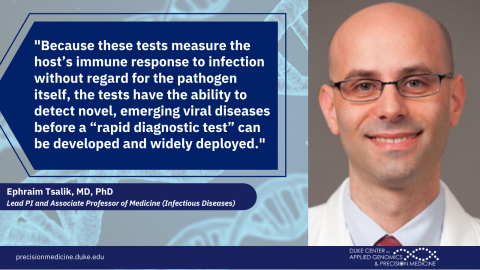
Duke Center for Applied Genomics & Precision Medicine faculty member, Ephraim Tsalik, MD, PhD, has received a grant from the Department of Defense to pursue, “Rapid, point-of-care, host gene expression test for presymptomatic viral infection and to distinguish bacterial from viral illness.”
Dr. Tsalik’s research is focused on understanding the dynamic between host and pathogen to discover and develop host-response markers that can diagnose and predict health and disease.
This funded proposal will develop two tests, HR-PreV (Host Response-PreViral) and HR-B/V (Host Response-Bacterial/Viral), measuring host gene expression signatures for viral infection and to distinguish bacterial from viral disease using a fully automated, sample-to-answer, point-of-care (POC) system.
The tests developed in this proposal, in partnership with Biomeme, a leader in point-of-care molecular diagnostic technology, will deliver timely and vital diagnostic information for emerging viral pathogens and improving respiratory health in the context of acute respiratory infections (ARI), one of the most frequently encountered medical conditions by military personnel, veterans, and the general public. By eliminating the need for complex laboratory analysis, patients and service personnel can be treated wherever they are: far-forward deployment areas, clinics, nursing homes, or hospitals. Biomeme’s small footprint, battery or plug-in power, ease of use, low cost, versatility, and reliability delivers advanced diagnostic capabilities quite literally anywhere.
Dr. Tsalik and colleagues at Duke have been working with Biomeme since 2018 to develop these tests. The Duke team’s biomarker discoveries had great potential but needed specialized technologies to enable their measurement at the point-of-care. Biomeme provided that solution. With a shared vision for how host response-based tests can revolutionize the way we think about diagnosis and disease management, the two groups worked closely and diligently to reach this critical stage of development. Their prior collaboration was supported in part by the NIH by way of the Antibacterial Resistance Leadership Group (arlg.org).
Because these tests measure the host’s immune response to infection without regard for the pathogen itself, the tests have the ability to detect novel, emerging viral diseases before a “rapid diagnostic test” can be developed and widely deployed.
The goal of Tsalik’s research is to deliver these two tests. HR-PreV can detect emerging viral infections without having to detect the virus itself. Moreover, this test is effective during the pre-symptomatic phase when people are unknowingly contagious. The second test, HR-B/V, will empower clinicians to know when a bacterial infection is present and when antibiotics are needed.
In the long-term, these tests will have unparalleled ability to impact how we manage emerging viral diseases and how we manage the globally ubiquitous challenges of antibiotic stewardship to improve patient and public health.